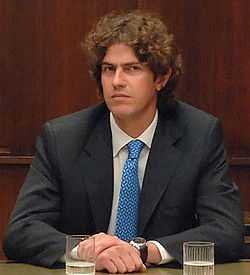Martín Lousteau
| Martín Lousteau | |
|---|---|
 | |
| Minister of Economy of Argentina | |
| In office 10 December 2007 – 24 April 2008 | |
| President | Cristina Fernández de Kirchner |
| Preceded by | Miguel Peirano |
| Succeeded by | Carlos Fernández |
| Personal details | |
| Born | December 8, 1970 Buenos Aires, Argentina |
| Spouse(s) | Carla Peterson |
| Alma mater | University of San Andrés London School of Economics |
Martín Lousteau (born December 8, 1970) was the Minister of Economy and Production of Argentina under the administration of President Cristina Fernández de Kirchner, from December 10, 2007, until April 24, 2008.[1] At the age of 37, Lousteau was the youngest person to occupy this office in more than five decades.[2]
Lousteau has occupied various public offices, as well as positions in the private sector. He was Chairman of the Bank of the Province of Buenos Aires and of the associated BAPRO group. He served as Minister of Production of Buenos Aires Province and Chief of Cabinet of the same, and was also a counselor for the Central Bank of Argentina. Previous to that, he was the head economist and then the director of the consulting firm APL Economía, on the areas of macroeconomics and politics.
Lousteau is a Licentiate in Economics (graduated summa cum laude from the Universidad de San Andrés), and a Master of Science in Economics (at the London School of Economics). He taught as a postgraduate professor at the Universidad Torcuato Di Tella, and as graduate professor at the Universidad de San Andrés.
He is the author of Sin Atajos (No Shortcuts, 2005), a history of Argentina's economic crises, with Javier González Fraga, and Hacia un Federalismo Solidario (Towards a Cooperative Federalism), as well as specialized works and journalistic articles that have been published in Argentina and abroad.
Besides his career as an economist, Lousteau was a tennis instructor (which he quit because of an injury), and also worked as war correspondent in Afghanistan for the magazines El planeta urbano and La Razón (before the September 11, 2001 attacks).[3]
Minister of Economy
One of the most salient features of his tenure has been the controversy surrounding his decision to increase the soybean export tax, which was previously fixed at 35%, so that it would fluctuate in line with global prices for the crop.[4] This has been claimed as the major cause of the protests in the Argentine countryside which took place in early 2008.[5] Lousteau was heavily involved in talks with farmers' leaders but was later sidelined.[6] After just two months, Lousteau was rumoured to have declared his intention to resign his post following disputes with fellow ministers, particularly Guillermo Moreno, although he denied he would resign.[7] Nevertheless, there was continued speculation on his resignation or replacement in the wake of the agrarian crisis.[8] Lousteau resigned on April 24, 2008, with the tax agency chief Carlos Fernández replacing him.[9]
According to the Wall Street Journal, Lousteau's brief tenure was clouded from the outset by interference from Néstor Kirchner's allies. Lousteau's policy initiatives often seemed to be eclipsed by those of a Kirchner loyalist, Guillermo Moreno, the secretary of Internal Commerce, described as "the administration's price policeman".[10] Lousteau is an ardent supporter of the Boca Juniors football team famed for Diego Maradona[citation needed].
References
- ↑ Martín Lousteau's CV
- ↑ MinutoUno, 14 November 2007: ¿Quién es Martín Lousteau, el nuevo ministro de Economía? (Spanish)
- ↑ Ecolink: Biografía de Martín Lousteau
- ↑ Argentina's Economy Minister Is Under Fire Over Soybean Tax. Wall Street Journal, April 7, 2008
- ↑ Time Magazine
- ↑ Clarín
- ↑ Clarín
- ↑ Clarín
- ↑ BBC News: Argentina's economy chief quits
- ↑ New Argentine Economy Chief to Stay Course. Wall Street Journal, April 26, 2008
| Preceded by Miguel Peirano |
Minister of Economy 2007–2008 |
Succeeded by Carlos Fernández |